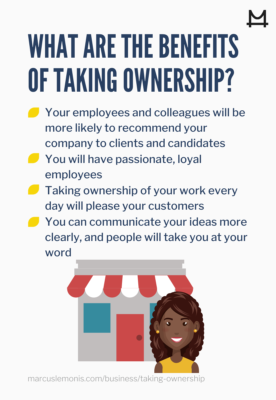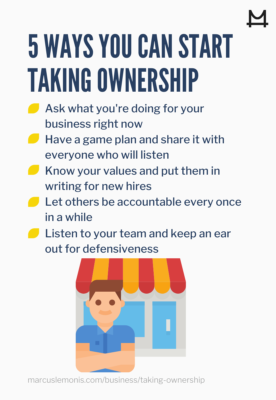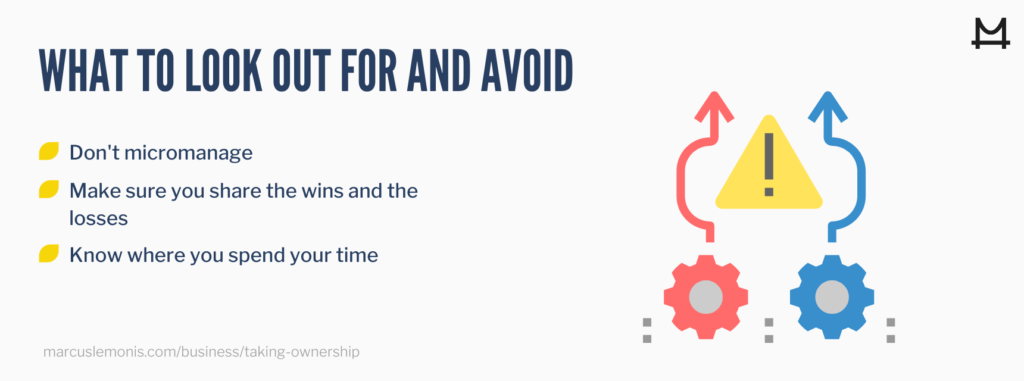Back when the American frontier was being settled, poker was played in just about every saloon across the west. Because players were suspicious of each other cheating, the players took turns dealing the cards. Each dealer was given a specific marker to put on the table in front of themselves. Most often, it was a knife with a buckhorn handle. That’s where the term “passing the buck” comes from – someone who didn’t want the responsibility of dealing the cards would pass it along to the next player.

If you’ve ever worked with or managed someone who was indecisive and unconcerned about their work, passing off their responsibilities to others, then you know how much of an issue this can cause in the workplace. Taking ownership of your work prevents those issues by showing others that you can be trusted, even when the job is serious. If everyone on your team is doing his or her part, big or small, then everything runs more smoothly. As Marcus likes to say, “Your job as the CEO of the business is to be the coach. Rather than running people under the bus, you’ve got to get them on the bus with you.”
Why Should I Take Ownership?
Employees who do the bare minimum are a drain of energy in the office. As a manager, it’s your job to inspire them. Make them more thoughtful of their work, give them the initiative, and keep their minds sharp. In essence, you have to teach them about taking ownership.
When an employee feels that they are contributing to your company’s overall achievements, they are personally invested in its success. You may feel more ownership in your business than your employees by the very nature of your job and title. Still, those benefits extend to you as well. An office full of employees proud of the work they put their names on is a constructive, rewarding place to be for all.
Is it Really That Important?
One of the unique things about being an entrepreneur or small business owner is that you are your first employee. You represent your company every day in two ways: the boss and the worker. Ultimately, your standards are the only ones that matter. That’s why taking ownership in business is so important. You’re taking ownership of your work, your employees’ work, and every other aspect of your company. At heart, taking ownership is about taking responsibility and having the initiative to lead. As an entrepreneur, you’ve already invested in yourself. Anything less than the best from you or your team is unacceptable as an investor. As Marcus has said, “People will work for recognition and opportunity more than they’ll work for anything else.” So here’s how to take ownership of your creation and inspire your team to do it too.
What Are the Benefits of Taking Ownership?

1. Feeling Ownership in Business can Expand Your Organization
Maybe you’ve heard of word-of-mouth recruitment. If not, it’s one of the most common ways employers fill jobs. Nobody wants to work for someone constantly making excuses. By taking ownership in business seriously, and ownership of your work just as thoughtfully, your employees and colleagues will be more likely to recommend your company to clients and candidates. Don’t let it go to your head, but keeping track of where your new hires and clients come from can give you data on where you’re being complimented and in what ways.
2. Who Doesn’t Want Passionate, Loyal Employees?
You get them by building a culture of trust and responsibility in your company. Every job your team completes is an opportunity to show that you are taking pride in a job well done, and not just attaching your name to work someone else did. Be sure to be a member of the team as well as the manager. As a leader, being enthusiastic about taking ownership is a great way to show your employees how to collaborate. “If you don’t have emotion and you don’t have passion, then you shouldn’t be in business, because money is a byproduct, not the purpose,” says Marcus.

3. Taking Ownership of Your Work Every Day Will Engage Your Customers
If you’re selling a product, a meal, a service, or information, your customers are what pay your bills. When you build a positive reputation in your industry by consistently knocking the socks off of your clients, you’re setting yourself heads and shoulders above your competition. This is something you should strive for with every sale and every interaction with your customers.
However, if you’re selling products that are unpopular with your customers and you’re not willing to ask them how to make them better, that is not taking ownership. Such was the case when Marcus visited a toy company in southern California. Marcus tried to teach this lesson to the owners by initiating a focus group with children and their parents in order to get valuable product feedback. He also introduced them to a potential licensing partner for their toy race cars that would help expand their market and build brand awareness. At the end of the day, it was the end of the deal. Marcus walked away because the owners kept getting sidetracked.
4. When You Take Ownership in Business, You Can Communicate Your Ideas More Clearly, and People Will Take You at Your Word
You can back up your talk with concrete examples of times when you came up with solutions for your employees, helped customers understand what they needed, and went above and beyond the norms. When you know exactly how each process you’ve created runs, you can build an outline of how each piece in your company is supposed to run. That shows integrity and consistency, hallmarks of ownership.


Five Ways You Can Start Taking Ownership of Your Work & Business
1. Ask What You’re Doing for Your Business Right Now
You should always be available to your team for questions and insight, but you should also know where improvements could be made. If you rest on your laurels, complacency can set in. When this happens, it’s usually downhill from there. A great example of this was when Marcus met with the owners of a restaurant who sold franchises of their concept in western Pennsylvania. After visiting several locations and speaking with the franchisees themselves, it was clear the owners did not care about long-term partnerships or even long-term growth. In any business, you expect certain things from the owner or boss such as open lines of communication, collaboration, accountability, and responsibility. If the owners of this Greek restaurant concept would have taken more ownership in setting up their franchisees for success rather than just showing up once a month to collect a check, this partnership would have been something worth breaking a few plates over. Lesson learned? Make yourself available to receive information in all shapes and forms. When walking past workers, read the room and determine where slack needs picking up or where pressure needs to be released. Your preemptive care for employee well-being and workload shows that you’ll take ownership in both the good times and the bad.

2. Have a Game Plan and Share it With Everyone Who Will Listen
If you don’t have a product process, now is the right time to create one and share it with your team. Above all, and like Marcus likes to say, “Trust the process.” Take the guessing out of your operation. Then, you can examine each step you’re taking to find improvements. Similarly, you should have a code of conduct that everyone in your office is familiar with. Know your role and make sure employees know what you’re there to help with.
You would be surprised how many employees don’t want to work through ideas or criticize their boss for fear of losing their job or for seeming like a burden. Remain open, take ownership in business, and let your staff know your goal is their success.
3. Know Your Values and Put Them in Writing for New Hires
Suppose even one employee thinks that you prioritize sales over quality, or that you don’t value inclusion in the office. In that case, you’re setting yourself up for trouble. By taking ownership as a manager, you are becoming responsible for your staff’s actions. Create a culture based on strong values, leadership, and responsibility, and then trust your employees to show it daily.

4. Let Others be Accountable Every Once in a While
When the buck stops at your desk, and you show ownership of your work and theirs, you’re displaying solid, dependable management. But, when you’re trying to get an employee to feel ownership in business, you can delegate responsibility their way. Responsibility instills pride in the quality of their work and the work of the people they are managing. When that happens, you have someone to help take some of your stress away, and you will free up time to work on other important aspects of your business.
Take Bank of America as an example. The bank was named one of the 100 best companies to work for partly because 82 percent of employees said it was a great place to be, particularly noting its “sense of camaraderie.” Bank of America also invests in leadership through several management fast-track programs and by providing educational resources. (Aldridge, 2019). Don’t be afraid to task employees with new goals or tasks and help them train for new roles and additional responsibilities.
5. Listen to Your Team and Keep an Ear Out For Defensiveness
If you want your employees to take ownership, you must recognize when someone feels their voice isn’t heard. Sometimes, defensiveness is a sign of not having ownership of projects. “Jim did that part, not me…” or “That wasn’t my idea in the first place…” can mean that you missed an opportunity to recognize a valuable suggestion from one of your team members. If your employees are still handing in good work, but get touchy about team failures, think about rearranging how things operate. Unhappy campers could just have untapped initiative and need a different challenge. You can find new talents everywhere if you keep your ears open.


What to Look Out For & Avoid
1. Don’t Micromanage
Although this is almost always good advice, it’s especially true if you want an employee taking ownership of their work. When you don’t let your team do what you hired them to do, it strips them of ownership. They can begin feeling like they’re working for someone who doesn’t value their talents. If you guide them on every step of their project, why should they feel ownership of what they created? Marcus says the best way to do this is, “You have to assign specific tasks to everybody so you don’t bump into each other and start arguing about silliness.” So give your employees a roadmap and let them get to the destination.

2. Share the Wins and the Losses
Too often, people mistake taking ownership in business for making themselves responsible when things go wrong. They can feel like the successes of a job well done are outweighed by the possibility of being the only person responsible if the job fails. The failure in those cases rests solely at management’s feet. Being part of a team means that everyone is accountable for fixing mistakes, even if they didn’t create them. Imagine if only the person who threw a lousy basketball shot tried to get the rebound.
When mistakes happen, as a boss, give your team enough time to fix it on their own. Be quick with compliments and slow to blame in the meantime. If employees feel supported, the same mistakes shouldn’t happen twice.
3. Know Where You Spend Your Time
You should take ownership of your work and be responsible for your team. However, keep in mind that not allowing your employees to feel ownership in business will suck the hours out of the day. As a manager, you don’t want to have to follow up on everyone’s daily output because you don’t trust them to handle it independently. Similarly, only spend your time on areas where it’s needed, and don’t be afraid to pick up slack where it’s necessary. You own every step of the process, no matter how small.


Owning a small business is literally a dream come true. It’s your imagination come to life. You own it, and you’re bringing it into the world much like a child is born, raised, and grows into an adult. And just as it can take a village to raise a child, as you take ownership of your work, the rest of your team members should feel that same sense of ownership and duty. That requires trust that everybody is working toward a similar goal and shares responsibility when something goes wrong. Basically, it’s feeling accountable to one another. Trust is key in any business relationship, and this is especially true for Marcus who believes, “If you have trust with somebody, it can survive any downturn, any mistake, any problem. And if you don’t have trust, it won’t matter how good the business is. It will fall apart eventually.”
- What are some things you currently do in your business to take ownership of your work?
- Are there any areas you can improve?
Aldridge, A. (2019, February 14). Bank of America named one of the 100 best companies to work for.
Retrieved from https://www.businesswire.com/news/home/20190214005509/en/Bank-America-Named-100-Companies-WorkOlito, F. (2019, August 2). 10 CEOs that started in entry-level positions at the companies they now lead.
Retrieved from https://www.businessinsider.com/ceos-started-entry-level-at-company-2019-7





